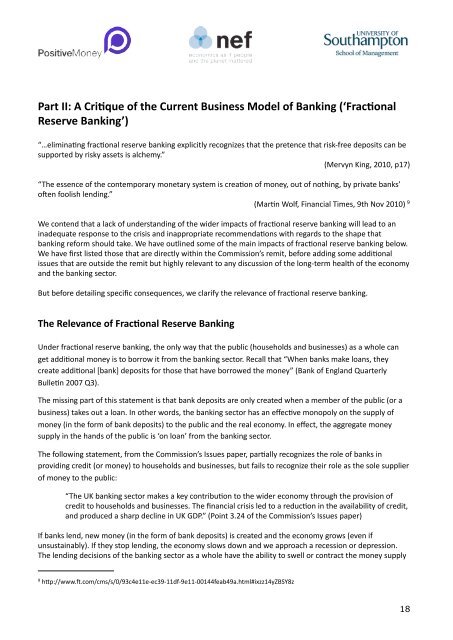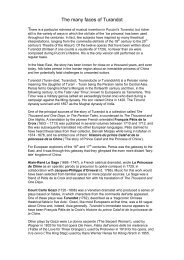NEF-Southampton-Positive-Money-ICB-Submission
NEF-Southampton-Positive-Money-ICB-Submission
NEF-Southampton-Positive-Money-ICB-Submission
Create successful ePaper yourself
Turn your PDF publications into a flip-book with our unique Google optimized e-Paper software.
Part II: A CriPque of the Current Business Model of Banking (‘FracPonal<br />
Reserve Banking’)<br />
“…eliminaGng fracGonal reserve banking explicitly recognizes that the pretence that risk-‐free deposits can be<br />
supported by risky assets is alchemy.”<br />
(Mervyn King, 2010, p17)<br />
“The essence of the contemporary monetary system is creaGon of money, out of nothing, by private banks’<br />
open foolish lending.”<br />
(MarGn Wolf, Financial Times, 9th Nov 2010) 9<br />
We contend that a lack of understanding of the wider impacts of fracGonal reserve banking will lead to an<br />
inadequate response to the crisis and inappropriate recommendaGons with regards to the shape that<br />
banking reform should take. We have outlined some of the main impacts of fracGonal reserve banking below.<br />
We have first listed those that are directly within the Commission’s remit, before adding some addiGonal<br />
issues that are outside the remit but highly relevant to any discussion of the long-‐term health of the economy<br />
and the banking sector.<br />
But before detailing specific consequences, we clarify the relevance of fracGonal reserve banking.<br />
The Relevance of FracPonal Reserve Banking<br />
Under fracGonal reserve banking, the only way that the public (households and businesses) as a whole can<br />
get addiGonal money is to borrow it from the banking sector. Recall that “When banks make loans, they<br />
create addiGonal [bank] deposits for those that have borrowed the money” (Bank of England Quarterly<br />
BulleGn 2007 Q3).<br />
The missing part of this statement is that bank deposits are only created when a member of the public (or a<br />
business) takes out a loan. In other words, the banking sector has an effecGve monopoly on the supply of<br />
money (in the form of bank deposits) to the public and the real economy. In effect, the aggregate money<br />
supply in the hands of the public is ‘on loan’ from the banking sector.<br />
The following statement, from the Commission’s Issues paper, parGally recognizes the role of banks in<br />
providing credit (or money) to households and businesses, but fails to recognize their role as the sole supplier<br />
of money to the public:<br />
“The UK banking sector makes a key contribuGon to the wider economy through the provision of<br />
credit to households and businesses. The financial crisis led to a reducGon in the availability of credit,<br />
and produced a sharp decline in UK GDP.” (Point 3.24 of the Commission’s Issues paper)<br />
If banks lend, new money (in the form of bank deposits) is created and the economy grows (even if<br />
unsustainably). If they stop lending, the economy slows down and we approach a recession or depression.<br />
The lending decisions of the banking sector as a whole have the ability to swell or contract the money supply<br />
9 h:p://www.i.com/cms/s/0/93c4e11e-‐ec39-‐11df-‐9e11-‐00144feab49a.html#ixzz14yZBSY8z<br />
18



